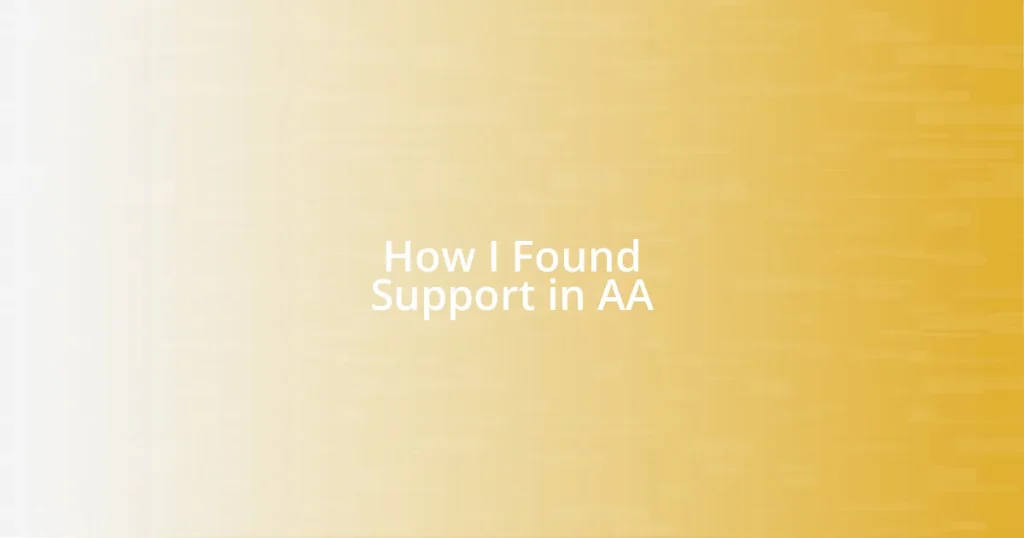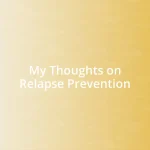Key takeaways:
- First AA meeting brought feelings of nervousness and relief, highlighting the importance of community and shared vulnerability.
- Engaging with fellow members through participation, listening, and socializing fostered deep connections essential for recovery.
- Utilizing AA resources, such as literature and the AA app, enhanced community support and provided guidance during challenging moments.
- Maintaining sobriety involves integrating supportive routines, reaching out to friends, and pursuing new interests for a fulfilling life post-recovery.
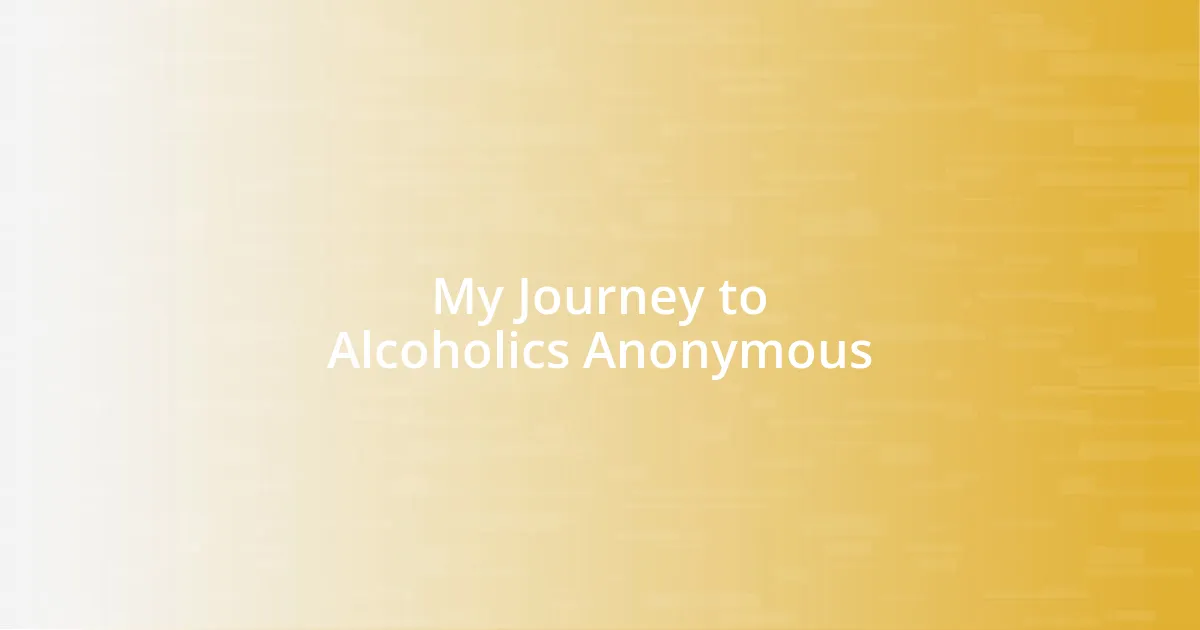
My Journey to Alcoholics Anonymous
The day I walked into my first Alcoholics Anonymous meeting felt like stepping into the unknown. I vividly remember feeling a mix of nervousness and relief as I sat in that circle, surrounded by faces that mirrored my own struggles. Was this really going to help me? That lingering question pushed me to listen closely, even when my inner critic was screaming that I didn’t belong.
As I listened to others share their stories, something shifted within me. The raw honesty of their experiences spoke to my heart, and I found myself nodding along, almost in disbelief at how similar our paths had been. It felt like a weight had begun to lift—could vulnerability be the key to healing? I was ready to find out.
In retrospect, it was in those moments of shared laughter and tears that I first glimpsed the power of community. I recall one particular story about someone who had hit rock bottom but found hope in the very same room I sat in. It dawned on me then: could I also transform my pain into something meaningful? This newfound realization fueled my determination to keep returning, to become a part of something greater than myself.

Understanding the AA Philosophy
Understanding the AA philosophy is about embracing a journey of self-discovery and connection. The framework encourages individuals to share their stories and struggles openly, fostering a sense of belonging that I’ve found to be incredibly healing. For me, the acknowledgment of our shared vulnerability created a space where I could begin to confront my own demons without judgment.
One of the core concepts in AA is the idea of surrendering to a higher power, which, for many, can be a challenging yet liberating experience. Initially, I grappled with this notion, unsure of what a higher power even meant to me. However, over time, I learned that it could be as simple as the collective strength we find in each other, reinforcing the idea that we don’t have to fight this battle alone.
Another key aspect is the Twelve Steps, which serve as a guide for personal growth and recovery. When I first approached these steps, they felt daunting, almost like a checklist to achieve. But as I took each step, I realized they are more like gentle reminders to reflect and reconnect, helping me to chart my path towards healing. Suddenly, they didn’t feel like an obligation but rather a comforting roadmap toward self-improvement and understanding.
| AA Philosophy Aspect | Personal Insight |
|---|---|
| Vulnerability and Community | Sharing my story helped me feel less alone; it sparked healing. |
| Surrender to a Higher Power | Embracing the concept taught me to lean on collective strength. |
| The Twelve Steps | Initially daunting, they became a roadmap for personal growth. |
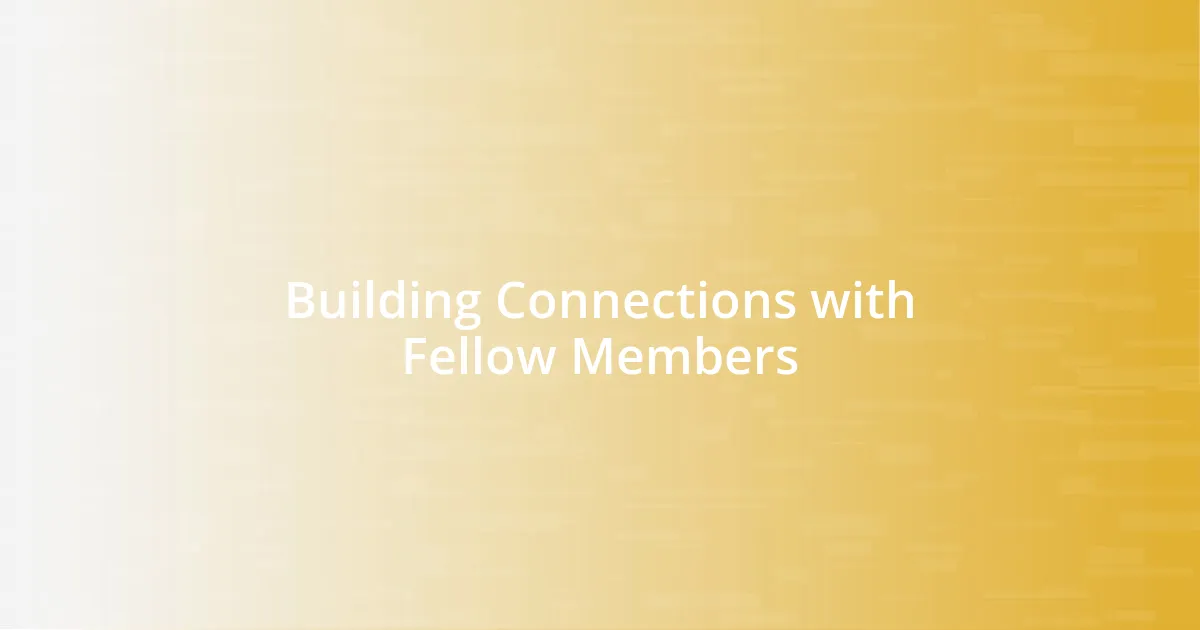
Building Connections with Fellow Members
Building connections with fellow members became a pivotal part of my recovery journey in AA. I once hesitated to engage, worried that my story wouldn’t resonate. Yet, one evening, a member shared a moment of vulnerability that mirrored my own experience. It struck me hard—here was someone who had felt lost and alone, just like I did. In that moment, I realized that opening up to others could forge bonds that were not only comforting but also transformative.
To enhance these connections, I noticed several ways to engage more deeply with fellow members:
- Participation: Actively joining discussions helps build rapport and trust.
- Listening: Truly listening to others’ stories fosters a sense of shared experience.
- Socializing: Meeting outside of regular meetings, whether for coffee or community events, creates a more personal connection.
- Support: Offering encouragement to others in their struggles often leads them to reciprocate the kindness.
- Celebrating Milestones: Acknowledging each other’s achievements can strengthen relationships and inspire everyone involved.
These seemingly small actions turned into meaningful experiences, pushing me to lean into the camaraderie fostered within the group. It’s in those shared moments of honesty and compassion that I discovered a profound sense of belonging I had long yearned for.
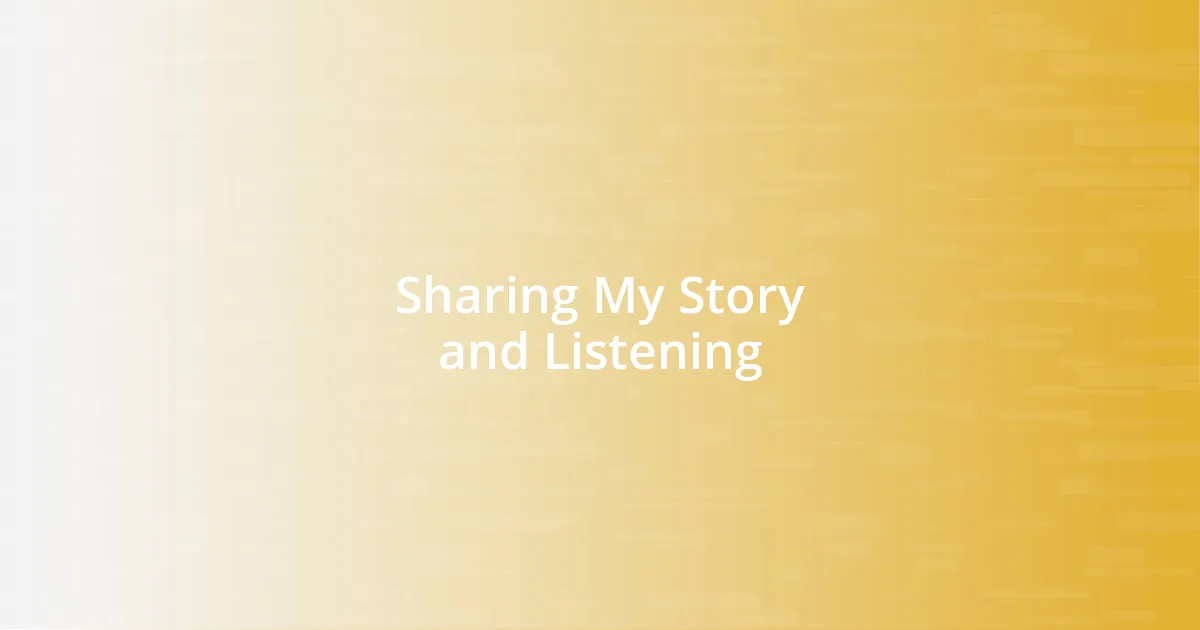
Sharing My Story and Listening
Sharing my story for the first time in a meeting felt like standing on the precipice of a great leap. As I took that leap, the fear of judgment faded when I saw the nods of understanding. Have you ever felt the weight of your secrets lift in the presence of knowing eyes? That was my experience, and it opened a door to genuine connection with others who carried similar burdens.
Listening has been just as crucial for my growth. During those sharing sessions, I found not only solace in my story but also immense wisdom in the stories of others. One member’s recollection of hitting rock bottom echoed my own dark moments, reminding me that I wasn’t alone. This reciprocal exchange nurtured a bond stronger than I could have imagined—didn’t I once crave that kind of connection?
I also realized that listening isn’t merely about hearing words; it’s about feeling the emotions behind them. When a new member shared their struggle, I could see the hesitation in their voice. Reflecting on that moment, I understood that every story, like every person, carries its own weight. I learned to respond not just with sympathy but with empathy—a deeper understanding born from shared experiences. How could a simple act of listening transform both my life and those around me? It has truly been a game-changer.

Leveraging AA Resources for Support
Leveraging the resources provided by AA has been a game-changer in my recovery journey. I remember the first time I discovered the literature they provided. Each book and pamphlet resonated with my struggles and provided me with insight I didn’t know I needed. Those written words felt like a personal conversation, guiding me through moments of uncertainty, and I often found myself dog-earing pages that spoke directly to my heart.
In addition to reading, I found that utilizing the AA app for meetings and local events greatly enhanced my sense of community. It felt almost like having a lifeline at my fingertips. Whenever I felt alone or tempted to relapse, I would check in, find a meeting nearby, and reconnect with the familiar faces that had become my support system. Isn’t it amazing how technology can bridge gaps and create community even in our toughest moments? That convenience was crucial for me, especially in those early days of sobriety.
Moreover, volunteering for service opportunities within AA truly helped me grow. The first time I helped organize an event, I felt a surge of purpose. I realized that contributing to the community not only strengthened my own recovery but also reinforced the bonds with others. Watching new members come in, filled with apprehension, and seeing their smiles as they found their place in the group reminded me of my own early days. Have you ever noticed how giving back can spark renewed motivation in your own journey? It certainly has for me.
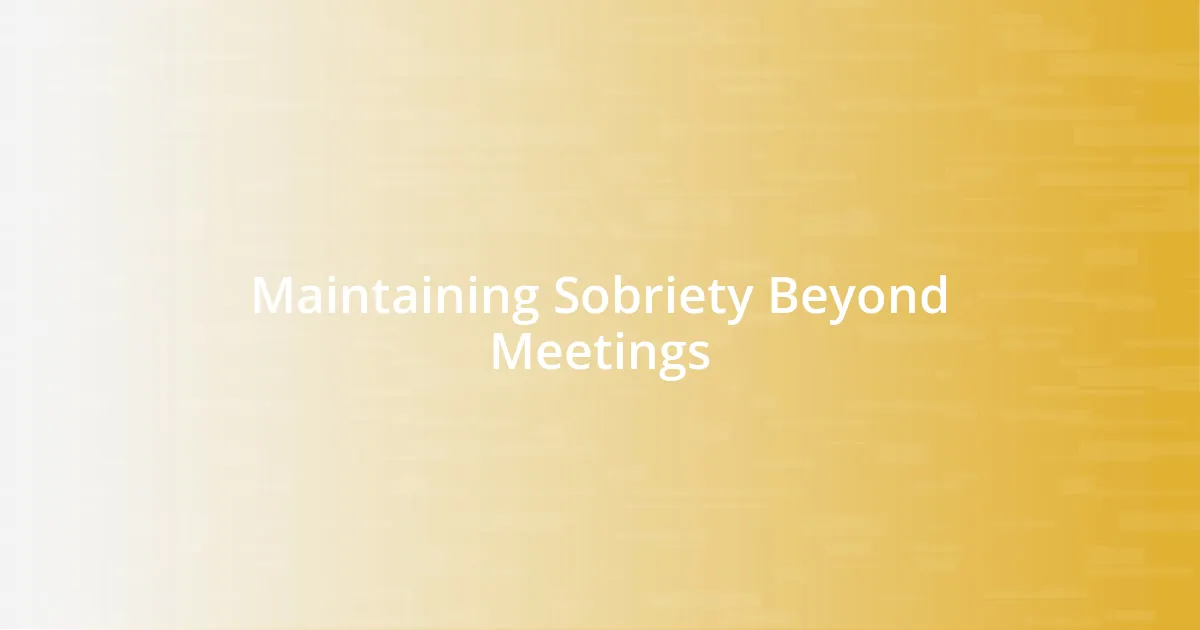
Maintaining Sobriety Beyond Meetings
Maintaining sobriety beyond the regular meetings is a continuous journey filled with both challenges and rewards. I’ve found that integrating supportive routines into my daily life has been essential. For instance, I committed to starting each day with a few moments of gratitude, often penning down three things that brought me joy. This simple practice grounded me and reminded me of what truly mattered, keeping my focus away from temptation.
Social connections outside of AA meetings have also played a pivotal role in my sobriety. When I felt a wave of anxiety creeping in, I’d reach out to friends who understood my journey. I remember one evening feeling a strong urge to drink; instead of giving in, I texted a fellow member. We ended up chatting for hours, and those candid conversations not only distracted me but also reinforced my commitment to a sober life. Isn’t it fascinating how sharing our vulnerabilities can fortify our resolve?
Additionally, expanding my interests helped me build a fulfilling life in sobriety. I took up hiking, which not only got me outdoors but also allowed for reflective moments. Each summit felt like a metaphor for overcoming obstacles—an empowering reminder that every step, no matter how tough, brought me closer to my goals. Have you found a passion that embodies your own journey? For me, these experiences have not only cultivated joy but have also cemented my foundation in maintaining sobriety.










